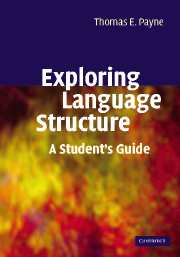Book contents
- Frontmatter
- Contents
- List of figures
- List of tables
- Preface
- Acknowledgments
- A note on transcriptions
- List of abbreviations
- 1 Introduction to morphology and syntax
- 2 Morphological processes and conceptual categories
- 3 Morphophonemics
- 4 Word classes
- 5 Exploring subclasses
- 6 Constituent structure
- 7 Language typology
- 8 Grammatical relations
- 9 Voice and valence
- 10 Multi-clause constructions
- Glossary
- References
- Subject and language Index
7 - Language typology
Published online by Cambridge University Press: 05 June 2012
- Frontmatter
- Contents
- List of figures
- List of tables
- Preface
- Acknowledgments
- A note on transcriptions
- List of abbreviations
- 1 Introduction to morphology and syntax
- 2 Morphological processes and conceptual categories
- 3 Morphophonemics
- 4 Word classes
- 5 Exploring subclasses
- 6 Constituent structure
- 7 Language typology
- 8 Grammatical relations
- 9 Voice and valence
- 10 Multi-clause constructions
- Glossary
- References
- Subject and language Index
Summary
A typology is simply a categorization of some range of phenomena into various types. To “typologize” something is to group its parts into types. For example, we often hear jokes like the following: “There are three kinds of people – those who can count, and those who can't.” Typological linguists are people who like to group languages into well-defined and useful types.
But what makes a typology useful? A typology is useful when it makes “predictions” about multiple characteristics of the items being typologized. For example, suppose we were to typologize motorized vehicles. Which would be the most meaningful typology, A or B?:
Typology A: bus, van, automobile, tractor
Typology B: red ones, green ones, blue ones, white ones
If you know that a motor vehicle is a bus, what else do you know about it? Quite a lot actually – it is probably going to be a large vehicle, with lots of seats, designed primarily to carry people, etc. If, on the other hand, you know some random motor vehicle is blue in color, there is not much else you can guess about its characteristics. Therefore, typology A is more useful, because it reflects “clusters” of structural and functional characteristics that go together, rather than simply indicating isolated properties.
Turning to a linguistic example, we could say that there are two kinds of languages in the world – those that have the sound [r] in their phonetic inventory and those that don't.
- Type
- Chapter
- Information
- Exploring Language StructureA Student's Guide, pp. 189 - 209Publisher: Cambridge University PressPrint publication year: 2006



